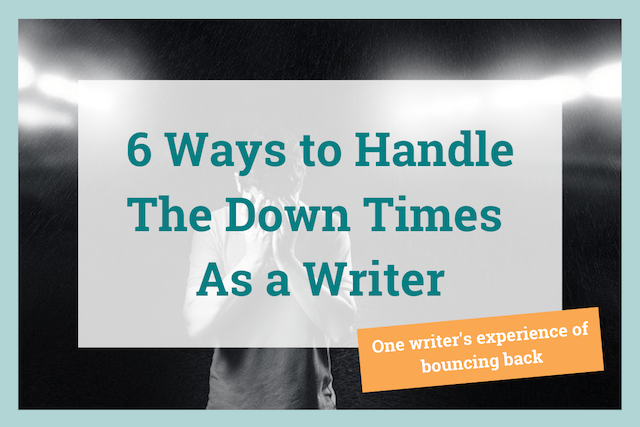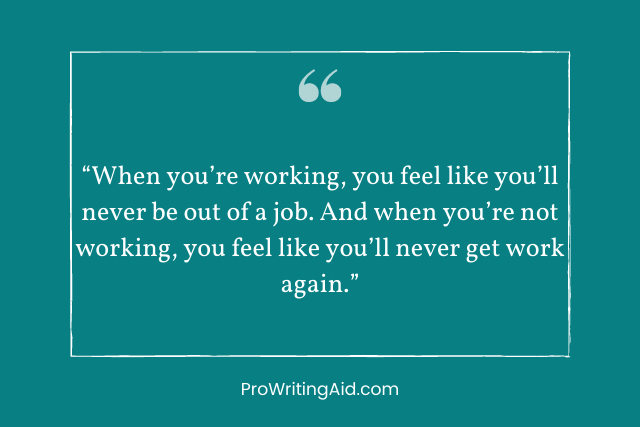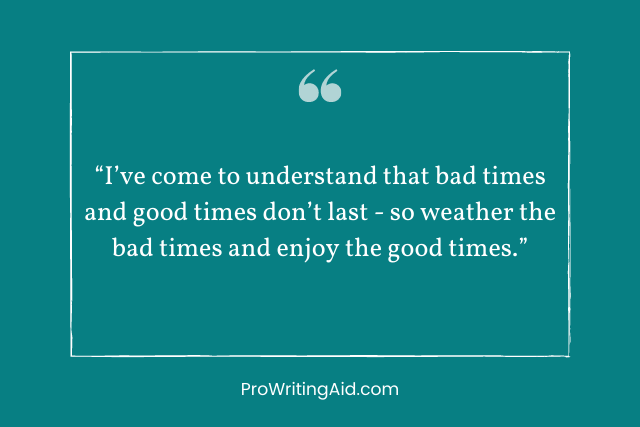
August 2018 was one of the lowest points of my professional career.
I had quit copywriting after a series of mediocre years. I dedicated every hour to my wood shop. I took on a few odd writing jobs, but largely stayed away.
My family couldn’t afford food. We were taking whatever money we could get in cash because our bank account was overdrawn and we needed the money for groceries and gas.
I felt like I was drowning—and there was no escape.
I’ve written about this on my own blog before, so I won’t recap the whole scenario. You can read it here, if you’d like. But during this time, I thought I had made every mistake I could have made, the damage was insurmountable, and we would be evicted, penniless, and my family of four would be living out of our minivan.
(Actually, the van wasn’t paid off, so the van would be repossessed. We’d be living out of our Ford Focus.)
It’s So Easy to Feel Helpless
Hulu has a fantastic documentary on the making of The Dana Carvey Show, an underrated bizarre sketch comedy show that aired in prime time for a handful of weeks in the mid-1990s.
If you’re not familiar with the show, it starred, obviously, Dana Carvey. He had still been a pretty big deal in the comedy world after a successful run on Saturday Night Live. He assembled a group of before-they-were-famous writers and actors that were so talented, you would have thought it was the greatest comedy show ever aired on TV.
Steve Carell. Robert Smigel. Stephen Colbert. Louis CK. Jon Glaser. Bob Odenkirk.
The documentary explores how the show came to be, what went wrong, and its legacy today.
Stephen Colbert had an excellent quote in the middle of the documentary. He and his wife had no money when they were hired to be on this show, which aired on ABC:

That one hit home. Hard.
After all, I watched it in 2018.
That helpless feeling is real—and suffocating. Unfortunately, it’s unavoidable.
Bad Times Are Inevitable
This article isn’t going to be a rant about the imperfect state of the world. That would be far too depressing, and it wouldn’t give me any opportunities to slip in jokes like I want to.
But the truth is, no matter how hard we try to build a utopia in this world, everyone has to go through bad times.
It may be financial, like ours was in 2018. It could be romantic. It could be health-wise. It could be bereavement. It could be political events here or around the world.
This world isn’t perfect and it never will be.
But this is actually a comfort.
Instead of avoiding bad times—keep going
In my opinion, far too much effort is spent trying to avoid bad times rather than weathering them. It’s crucial to build the personal strength that you need to get through them.
In fact, the bad times could be exactly what you need.
6 Ways to Handle the Down Times
When you get hit with a bad stretch, start taking steps immediately to steel yourself and move forward:
1. Grieve the good times
Never deny your feelings. Even if you are the eternal optimist like I seem to be in these situations, you have to let yourself get upset. It’s okay to not be okay. Cry. Mourn. Be depressed. Be sad. Be angry. Let those feelings be there. No sense in trying to deny them. Besides, it can be therapeutic to accept them.
2. Reflect on why it’s happening
This is important. Once you’ve cleared your head emotionally, you have to dissect what’s going on. In 2018, I had to look at how I was spending my time, what efforts I was making to increase business, and in what ways I slipped up and focused on the wrong things that led me to that bottoming-out period in my career.
3. Be grateful
Even though you are grieving and hurting, you have to find ways to be grateful for the good things in your life to avoid spiraling. If you spiral, you lose control of your emotions. Then it is impossible to clear your mind and get back on track.
Keep a gratitude journal. Or just find reasons to smile every day. After a long week of not making money, not sleeping, working myself ragged, and trying to piece together dinners for my family, there was nothing like putting some music on in the living room and having a dance party with my boys. It was exactly what my soul needed.
4. Recognize that it won’t be forever
This is the hardest thing to do when you’re lost. Just find ways to remind yourself that this isn’t your permanent state. If you don’t truly believe that you will get out of it, then you will never get out of it. Train your brain to see opportunity. And then…
5. Start building your exit strategy
The only way out is through it. How can you get through it and come out the other side?
For me, it was a matter of admitting what wasn’t working and looking to what would work. I knew that writing would work because so many other people had done it successfully. Heck, I had been successful for years before this! I figured out how I was going to target new writing clients and drum up business.
It never gets fixed overnight, so just being realistic about expectations can be encouraging. When my wife gave me an ultimatum and said she couldn’t do it anymore, I didn’t tell her that I’d have it fixed by the end of August. I told her I could show potential by then… and I did.
6. Double down on what works
For whatever reason, this is the hardest lesson for me to learn. When I tried to live off wood shop income, it failed for a variety of reasons. I wasn’t managing it well. By March, I should have been looking at rebuilding my writing career. But I didn’t. I kept doubling down on what wasn’t working. If you’re desperate, go back in your mind to when you weren’t and try to get back there again!
That’s the bad times. But as a buddy of mine once said, “I’ve come to understand that bad times and good times don’t last—so weather the bad times and enjoy the good times.”

Make the Good Times Count
Successful people don’t just handle the bad times—they handle the good times too.
If you’re running on autopilot, you might ride a rollercoaster of emotions far more often than others. That’s what happened to me: 2013–2014 was so good that I didn’t really take stock of what was happening. When things started falling apart, I wasn’t prepared.
Here’s how to prepare yourself during the good times:
1. Enjoy them
Just like you have to grieve the bad times, you have to savor the good times. It’s okay to allow your emotions to take charge from time to time. If things are good, you have no reason to feel guilty, ashamed, or worried. Just sit back and enjoy them.
2. Recognize why they are good
Now we’re back to reflection. Just like you should analyze your bad times, analyzing your good times can help you consciously make decisions that can make those good times last a lot longer. Why are you doing well? What decisions have you made that led to this?
3. Prepare for the coming bad times
This isn’t about being worried, it’s about being realistic. My family and I are in unprecedented good times right now. We’ve bounced back from 2018 in a big way.
Are we dropping lots of money on vacations and new cars? No. We bought new tires for the van. We bought a deep freezer and fill it with meat as regularly as we can. We put some money aside in a savings account. We pay one month ahead on rent. I am regularly maintaining and improving relationships with potential clients. I’ve invested in some copywriting courses for good measure.
These are all ways you can stockpile resources that you can lean on when things go south later, softening the blow.
Life Is Full of Seasons
I love referring to these times as seasons, which I stole from Chip and Joanna Gaines in their book, The Magnolia Story.
Calling it a season allows you to recognize that it is temporary, always changing, and another season will follow it that will be completely different.
That’s life!
The beautiful part is, as a writer, each season of life offers an opportunity for you. It’s a chance to deeply reflect in a journal. Or it’s an opportunity to learn lessons that you can pass onto others using stories from this dark period in your life.
Or it can be a time to recalibrate: what are you writing, what could you be writing, and what deserves more of your creative energy right now?
As long as you understand that it won’t last, and you keep your head up, you can find a way through it.
And sometimes, getting through it is all you can do.
Don’t worry: you’ll come out the other side a little stronger.
Let’s take a quick look at a clip that explains why The Dana Carvey Show was a bad fit for its time and network, and enjoy watching Steve Carell and Stephen Colbert laugh so hard they can’t breathe. A good writers’ lesson in understanding your audience.
[Warning: language gets strong after the 1:30 mark, so drop out there if you want to avoid it.]
Boy, no wonder that show didn’t last. But those guys turned out all right in the end…


